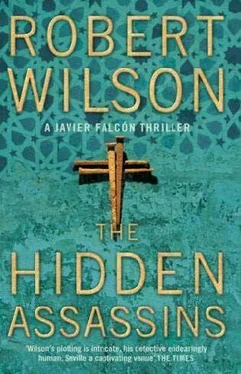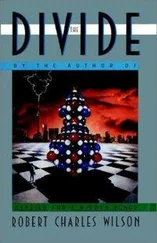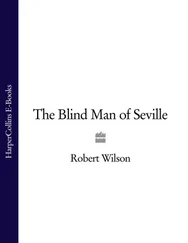Robert Wilson - The Hidden Assassins
Здесь есть возможность читать онлайн «Robert Wilson - The Hidden Assassins» — ознакомительный отрывок электронной книги совершенно бесплатно, а после прочтения отрывка купить полную версию. В некоторых случаях можно слушать аудио, скачать через торрент в формате fb2 и присутствует краткое содержание. Жанр: Триллер, на английском языке. Описание произведения, (предисловие) а так же отзывы посетителей доступны на портале библиотеки ЛибКат.
- Название:The Hidden Assassins
- Автор:
- Жанр:
- Год:неизвестен
- ISBN:нет данных
- Рейтинг книги:4 / 5. Голосов: 1
-
Избранное:Добавить в избранное
- Отзывы:
-
Ваша оценка:
- 80
- 1
- 2
- 3
- 4
- 5
The Hidden Assassins: краткое содержание, описание и аннотация
Предлагаем к чтению аннотацию, описание, краткое содержание или предисловие (зависит от того, что написал сам автор книги «The Hidden Assassins»). Если вы не нашли необходимую информацию о книге — напишите в комментариях, мы постараемся отыскать её.
The Hidden Assassins — читать онлайн ознакомительный отрывок
Ниже представлен текст книги, разбитый по страницам. Система сохранения места последней прочитанной страницы, позволяет с удобством читать онлайн бесплатно книгу «The Hidden Assassins», без необходимости каждый раз заново искать на чём Вы остановились. Поставьте закладку, и сможете в любой момент перейти на страницу, на которой закончили чтение.
Интервал:
Закладка:
'Don't make them too difficult,' said Falcon. 'I've had a long day.'
'Tell us how you came to meet Yacoub Diouri.'
'That could take some time,' said Falcon.
'We're not in any hurry,' said Pablo.
And, as if at some prearranged signal, Juan and Gregorio sat back, took out cigarette packs and lit up. It was one of those occasions after a long day, with a little beer and food inside him, that made Falcon wish he was still a smoker.
'I think you probably know that just over five years ago, on 12th April 2001, I ran a murder investigation into the brutal killing of an entrepreneur turned restaurateur called Raul Jimenez.'
'You've got a policeman's memory for dates,' said Juan.
'You'll find that date written in scar tissue on my heart when I'm dead,' said Falcon. 'It's got nothing to do with being a policeman.'
'It had a big impact on your life?' said Pablo.
Falcon took another fortifying gulp of Cruzcampo.
'The whole of Spain knows this story. It was all over the newspapers for weeks,' said Falcon, a little irritated with the knowingness with which the questions had started coming at him.
'We weren't in Spain at the time,' said Juan. 'We've read the files, but it's not the same as hearing it for real.'
'My investigation into Raul Jimenez's past showed that he'd known my father, the artist Francisco Falcon. They'd started a smuggling business together in Tangier during and after the Second World War. It meant they could establish themselves and start families and Francisco Falcon could begin the process of turning himself into an artist.'
'And what about Raul Jimenez?' said Pablo. 'Didn't he meet his wife when she was very young?'
'Raul Jimenez had an unhealthy obsession with young girls,' said Falcon, taking a deep breath, knowing what they were after. 'It wasn't so unusual in those days in Tangier or Andalucia for a girl to get married at thirteen, but in fact her parents made Raul wait until she was seventeen. They had a couple of children, but they were difficult births and the doctor recommended that his wife didn't have any more.
'In the run-up to Moroccan independence in the 1950s, Raul became involved with a businessman called Abdullah Diouri who had a young daughter. Raul had sex with this girl and, I think, even got her pregnant. This would not have been a problem had he done the honourable thing and married the girl. In Muslim society he would have just taken a second wife and that would have been the end of it. As a Catholic, it was impossible. To complicate matters further, despite doctor's orders, his wife became pregnant with their third child.
'In the end Raul took the coward's way out and fled with his family. Abdullah Diouri was incensed when he discovered this and wrote a letter to Francisco Falcon in which he told him of Raul's betrayal and expressed his determination to be avenged, which he achieved five years later.
'The third child, a boy called Arturo, was kidnapped on his way back from school in southern Spain. Raul Jimenez's way of dealing with this terrible loss was to deny the boy's existence. It devastated the family. His wife committed suicide and the children were damaged, one of them beyond repair.'
'Was it that sad story that made you decide to try to find Arturo thirty-seven years after he had disappeared?' asked Pablo.
'As you know, I met Raul's second wife, Consuelo, while investigating his murder. About a year later we started a relationship and during that time we revealed to each other that the one thing that still haunted us about her husband's murder case, and all that surfaced with it, was the disappearance of Arturo. There was still a part of us that imagined the eternally lost six-year-old boy.'
'That was in July 2002,' said Pablo. 'When did you start looking for Arturo?'
'In September of that year,' said Falcon. 'Neither of us could believe that Abdullah Diouri would have killed the child. We thought he would have drawn him into his family in some way.'
'And what was driving you?' asked Juan. 'The lost boy…or something else?'
'I knew very well I was looking for a forty-three-year-old man.'
'Had something happened to your relationship with Consuelo Jimenez in the meantime?' asked Pablo.
'It finished almost as soon as it started, but I'm not going to discuss that with you.'
'Didn't Consuelo Jimenez break off the relationship?' asked Pablo.
'She broke it off,' said Falcon, throwing up his hands, realizing that the whole of the Jefatura knew what had happened. 'She didn't want to get involved.'
'And you were unhappy?'
'I was very unhappy about it.'
'So what was your motive in looking for Arturo?' asked Juan.
'Consuelo refused to see me or speak to me. She cut me out of her life.'
'Not unlike what Raul had tried to do with Arturo,' said Juan.
'If you like.'
Juan took a pickled garlic and bit into it with a light crunch.
'I realized that the only way I'd be able to see her again under the right circumstances, rather than as a mad stalker, was to do something extraordinary. I knew that if I found Arturo she would have to see me again. It was the way we had connected in the first place and I knew it would stir something in her.'
'And did it work?' asked Juan, fascinated by Falcon's torment.
16
Seville-Tuesday, 6th June 2006, 20.45 hrs
A warm breeze made a circuit of the patio and stirred up a large, dead and dried-out plant in a far dark corner of the cloister.
'I think it would be better to approach this chronologically,' said Pablo. 'Why don't you tell us how you found Arturo Jimenez?'
The rustle and rattle of the plant's dead leaves had drawn Falcon's gaze to its desiccated corner. He had to get rid of that plant.
'Because my search for Arturo was motivated by this hope for reconciliation with Consuelo, I imagined it as a sort of quest. It was a little more straightforward than that. I was lucky to have some help,' said Falcon. 'I went to Fes with a member of my new Moroccan family. He found a guide who took us to Abdullah Diouri's house deep in the medina. Apart from a magnificently carved door, the house looked like nothing from the outside. But the door opened into a paradise of patios, pools and miniature gardens, which had been allowed to decay from some greater former glory. There were tiles missing and cracked paving and the latticework around the gallery was broken in places. The servant who let us in told us that Abdullah Diouri had died some twenty years ago but that his memory lived on, as he had been a great and kind man.
'We asked to speak to any of the sons, but he told us that only women lived in this house. The sons had dispersed throughout Morocco and the Middle East. So we asked if one of the women would be willing to speak to us about this delicate matter that had occurred some forty years ago. He took our names and left. He returned after quarter of an hour and told my Moroccan relative to stay at the door while he took me on a long trip through the house. We ended up on the first floor, with a view through some repaired latticework on to a garden below. He left me there and after a while I realized that there was somebody else in the room. A woman dressed in black, her face totally veiled, pointed me to a seat and I told her my story.
'Fortunately I'd talked to my Moroccan family about what I was intending to do, so I knew I had to be very careful about how I related this story. It had to be from the Moroccan perspective.'
'What did that entail?' asked Juan.
'That Raul Jimenez had to be the villain of the piece and Abdullah Diouri the saviour of the family honour. If I sullied the name of the patriarch in any way, if I made him out to be a criminal, a kidnapper of children, I would get nowhere. It was good advice. The woman listened to me in silence, still as a statue under a black dustsheet. At the end of my story a gloved hand came out of her robe and dropped a card on to a low table between us. Then she got up and left. On the card was printed an address in Rabat with a telephone number and the name Yacoub Diouri. A few minutes later the servant came back and returned me to the front door.'
Читать дальшеИнтервал:
Закладка:
Похожие книги на «The Hidden Assassins»
Представляем Вашему вниманию похожие книги на «The Hidden Assassins» списком для выбора. Мы отобрали схожую по названию и смыслу литературу в надежде предоставить читателям больше вариантов отыскать новые, интересные, ещё непрочитанные произведения.
Обсуждение, отзывы о книге «The Hidden Assassins» и просто собственные мнения читателей. Оставьте ваши комментарии, напишите, что Вы думаете о произведении, его смысле или главных героях. Укажите что конкретно понравилось, а что нет, и почему Вы так считаете.












